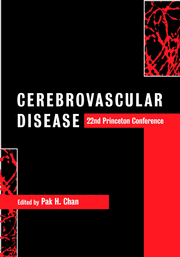Book contents
- Frontmatter
- Contents
- List of contributors
- Preface
- Acknowledgments
- Part I Special lectures
- Part II Oxidative stress
- Part III Apoptosis
- Part IV Hot topics
- 10 Astrocytes in ischemic stroke
- 11 Aquaporin-4 water channels and brain edema
- 12 Neuroprotection with tetracyclines in brain ischemia models
- 13 Spreading depression: a teleological means for self-protection from brain ischemia
- Part V Hemorrhage, edema and secondary injury
- Part VI Inflammation
- Part VII Gene transfer and therapy
- Part VIII Neurogenesis and plasticity
- Part IX Magnetic resonance imaging in clinical stroke
- Part X Risk factors, clinical trials and new therapeutic horizons
- Index
- Plate section
12 - Neuroprotection with tetracyclines in brain ischemia models
from Part IV - Hot topics
Published online by Cambridge University Press: 02 November 2009
- Frontmatter
- Contents
- List of contributors
- Preface
- Acknowledgments
- Part I Special lectures
- Part II Oxidative stress
- Part III Apoptosis
- Part IV Hot topics
- 10 Astrocytes in ischemic stroke
- 11 Aquaporin-4 water channels and brain edema
- 12 Neuroprotection with tetracyclines in brain ischemia models
- 13 Spreading depression: a teleological means for self-protection from brain ischemia
- Part V Hemorrhage, edema and secondary injury
- Part VI Inflammation
- Part VII Gene transfer and therapy
- Part VIII Neurogenesis and plasticity
- Part IX Magnetic resonance imaging in clinical stroke
- Part X Risk factors, clinical trials and new therapeutic horizons
- Index
- Plate section
Summary
Introduction
Several studies have indicated that inflammation, which involves non-neuronal cells, has an important role in the pathogenesis of acute and chronic brain diseases, including stroke. In global ischemia, delayed hippocampal damage is observed 3 to 5 days after the insult to CA1 pyramidal neurons, suggesting that mechanisms that develop slowly after ischemia have a role in hippocampal ischemic cell death. Furthermore, clinically common focal ischemia caused by occlusion of the middle cerebral artery involves secondary inflammation that significantly contributes to the outcome after ischemic insult. Several pro-inflammatory genes or mediators, such as inducible nitric oxide synthase (iNOS), cyclooxygenase-2 (COX-2) and cytokines, are strongly expressed in the ischemic brain. Inflammation is now considered an attractive pharmacological target because it progresses over several days after acute brain injury, and interference with inflammatory mechanisms, which are not fundamental for physiological brain functions, may not result in intolerable side effects, as the wide clinical use of non-steroidal anti-inflammatory drugs demonstrates.
Tetracyclines are well-known bacteriostatic antibiotics with broad-spectrum antimicrobial activity. In the late 1960s the so-called long-acting, second-generation tetracyclines, doxycycline and minocycline, were synthesized. These semisynthetic antibiotics are rapidly and completely absorbed, even in an aged population, and, compared to many other antibiotics, they have an excellent tissue penetration into the brain and cerebrospinal fluid. Doxycycline and minocycline are exceptional tetracycline derivatives in that they exert biological effects that are completely separate and distinct from their antimicrobial action.
- Type
- Chapter
- Information
- Cerebrovascular Disease22nd Princeton Conference, pp. 135 - 141Publisher: Cambridge University PressPrint publication year: 2002



